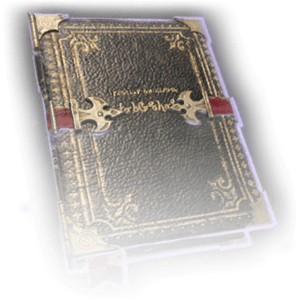Ad placeholder
Judge of the Damned: Difference between revisions
(Created page with "{{MiscItemPage | description = This book is redolent with the enticing smell of paper and ink. | quote = This book is redolent with the enticing smell of paper and ink. | book text = [An excerpt from the book in which Iphigen Mohgros discusses the strange theistic history of mortals becoming gods.] There have been many Lords of Death who cast judgement upon souls lost and found alike. Among them was Kelemvor, a hard man of harder convictions. As a mortal man he was a m...") |
Agentclank05 (talk | contribs) m (Adding location and image) |
||
| Line 1: | Line 1: | ||
{{MiscItemPage | {{MiscItemPage | ||
| image = Book_WizardyGenericD.png | |||
| icon = Book Tome K Item Icon.png | |||
| description = This book is redolent with the enticing smell of paper and ink. | | description = This book is redolent with the enticing smell of paper and ink. | ||
| quote = This book is redolent with the enticing smell of paper and ink. | | quote = This book is redolent with the enticing smell of paper and ink. | ||
| Line 9: | Line 11: | ||
Mortals are allowed caprice, but immortality wears that stone smooth quickly, and Kelemvor chose cool prudence over cold malice. | Mortals are allowed caprice, but immortality wears that stone smooth quickly, and Kelemvor chose cool prudence over cold malice. | ||
| where to find = In Malus Thorm's office in the [[House of Healing]] | |||
| type = Books | | type = Books | ||
| rarity = common | | rarity = common | ||
Revision as of 04:12, 28 September 2023
This book is redolent with the enticing smell of paper and ink.
This book is redolent with the enticing smell of paper and ink.
Properties
 Books
Books Rarity: Common
Rarity: Common Weight: 0.5 kg / 1 lb
Weight: 0.5 kg / 1 lb Price: 14 gp
Price: 14 gp
Where to find
In Malus Thorm's office in the House of Healing
Text
[An excerpt from the book in which Iphigen Mohgros discusses the strange theistic history of mortals becoming gods.] There have been many Lords of Death who cast judgement upon souls lost and found alike. Among them was Kelemvor, a hard man of harder convictions.
As a mortal man he was a mercenary with a paladin's stoic beliefs hidden under a crust of scowls and grumbles. As Lord of Death, he was forced to mellow both aspects of himself, for the impulses of a man and a god are not consummate.
Mortals are allowed caprice, but immortality wears that stone smooth quickly, and Kelemvor chose cool prudence over cold malice.
